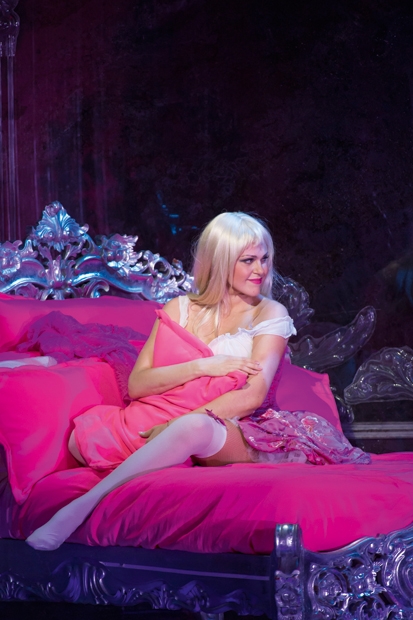This season has already seen Manon Lescaut appear in several different operatic guises across the UK, but it was Covent Garden’s new production of Puccini’s version (its first staging of it in three decades) that was the hottest ticket of all. The Latvian soprano Kristine Opolais and the superstar tenor Jonas Kaufmann were tackling the roles of the lovers, Manon and Des Grieux, for the first time. Antonio Pappano, in the repertoire where he most reliably excels, was in the pit.
In an introductory talk before the production opened, the conductor tentatively drew a comparison between Puccini’s first major success and Mark-Anthony Turnage’s Anna Nicole, which opens the Royal Opera’s next season. He has a point, of course, not least because Manon — especially in Puccini’s work — is a heroine who can be seen, depending on one’s point of view, as either exploiter or exploited, a victim of others or of herself. Puccini relished these contradictions, but what his score should also do is elevate Manon, placing her tragedy on a level where the moral balance sheet is swept away as we’re swept along — the composer himself proclaimed that while Massenet, whose earlier Manon he knew, ‘will feel it as a Frenchman, with powder and minuets … I will feel it as an Italian, with desperate passion.’
Pappano certainly feels the piece as an Italian, with conducting of marvellous lyrical flexibility and fierce conviction; the account of the Intermezzo was magnificent. But Jonathan Kent’s new modern-dress production (with grim designs by Paul Brown) might in part be what suggested the Anna Nicole parallel: there’s little more than a boob job to separate the real-life Playboy model from Opolais’s Manon here after she’s abandoned Des Grieux and become a Barbie doll for old, rich Geronte. In puffy pink mini-dress and knee-high stockings, she’s filmed in dirty close-up and paraded in a sex show in front of his old friends in a ghastly, plasticky boudoir.
Act 3 becomes a bizarre, nightmarish reality TV show, against the backdrop of a dingy multi-roomed brothel, with the parade of fallen women forced through a hole brutally torn in a large hoarding — advertising a perfume called ‘Naïveté’. On the other side of it, instead of the American desert, is a half-built road to nowhere. The imagery is not subtle; nor is the production as a whole. It isn’t very coherent either, especially with its occasional lapses into surrealism and meta-theatrics. And it’s so busy wagging its finger at us all that it fails to realise that, in parading a soprano in the way it does, it risks being complicit in the game of exploitation it seeks to criticise.
It also serves to dampen the passion of Puccini’s patchy but powerful early score. So did the fact that, although Opolais and Kaufmann both look ideal and found an extra gear for an impressive final act, they sounded tentative for much of the first-night performance, unable to match vocally the emotions surging from the pit — often with rather too little concern for balance. Kaufmann sang with a great deal of elegance and refinement, and acted with detail, but the voice — from my seat at least — sounded tired, the top notes lacking the usual trumpeting power. Opolais sang beautifully, too, but struggled to project in the middle of her range. Christopher Maltman’s forceful, cocky Lescaut headed the strong secondary cast. Some elements burnt brightly, but as a whole the evening left me cold.

Luca Francesconi’s chamber opera Quartett is very loosely based on another 18th-century French novel, Les Liaisons Dangereuses. But it comes via Heiner Müller’s play of 1982, which lifts two of Laclos’s characters, the Vicomte de Valmont and the Marquise de Merteuil, and plonks them in a post-apocalypse bunker; the two other ‘characters’ of the foursome are created when they indulge in bizarre role-play. It’s every bit as forbidding as it sounds, and for once the Linbury Studio Theatre felt like an appropriate match of venue to repertoire. But with seating on either side of the stage, and a triangular slab of stage across it that left the pit open — on my side, at least — very few words came across. What dramatic subtleties there might have been remained largely undetectable, while the action also seemed to have been confused by John Fulljames’s production (the first in the UK), which, in Soutra Gilmour’s designs, went all out for grim destitution. Something a little more stylised and poetic, or clear-cut, might have helped.
As the two protagonists, Leigh Melrose and Kirstin Chávez gave it their all. Francesconi’s 80-minute score provides an ingenious, atmospheric mixture of the acoustic (provided by the London Sinfonietta, conducted by Andrew Gourlay) and the electronic. But, with more conversation than drama, and so little of it comprehensible, it felt a longer evening than it was.






Comments